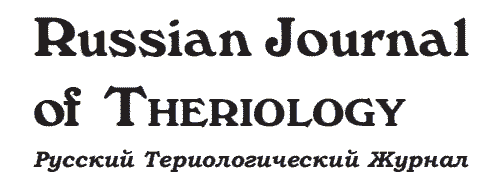The complete mitochondrial genomes of Altai vole Microtus obscurus and common vole Microtus arvalis (Rodentia: Arvicolinae)
Kostin D.S., Gromov A.R., Lavrenchenko L.A.
P. 137-141
Within the frame of the current study, we assembled and annotated seven mitochondrial genomes: three of them for the first time obtained for the Altai vole M. obscurus, four belong to the Eastern lineage of common vole M. arvalis. Obtained sequences enlarge amount of available genomic data for two sister vole species that creates the basis for further studies on phylogeny and mechanisms of adaptive mitochondrial DNA introgression, apparently took place within the group under study.
DOI: 10.15298/rusjtheriol.22.2.06References- Abramson N.I., Bodrov S.Y., Bondareva O.V., Genelt-Yanovskiy E.A. & Petrova T.V. 2021. A mitochondrial genome phylogeny of voles and lemmings (Rodentia: Arvicolinae): Evolutionary and taxonomic implications // PLoS One, Vol.16. No.11. P.e0248198.
- Andrews S., Krueger F., Segonds-Pichon A., Biggins L., Krueger C. & Wingett S. 2010. FastQC: aquality control tool for high throughput sequence data // Babraham Bioinformatics.
- Baker R.J., Hamilton M.J., Van Den Bussche R.A., Wiggins L.E., Sugg D.W., Smith M.H., Lomakin M.D., Gaschak S.P., Bundova E.G., Rudenskaya G.A. & Chesser R.K. 1996. Small mammals from the most radioactive sites near the Chornobyl nuclear power plant // Journal of Mammalogy. Vol.77. No.1. P.155–¬¬170.
- Barbosa S., Pauperio J., Searle J.B. & Alves P.C. 2013. Genetic identification of Iberian rodent species using both mitochondrial and nuclear loci: Application to noninvasive sampling // Molecular Ecology Resources. Vol.13. No.1. P.43–56.
- Beysard M. & Heckel G. 2014. Structure and dynamics of hybrid zones at different stages of speciation in the common vole (Microtus arvalis) // Molecular Ecology. Vol.23. No.3. P.673–687.
- Boratyński Z., Melo-Ferreira J., Alves P.C., Berto S., Koskela E., Pentikäinen O.T., Tarroso P., Ylilauri M. & Mappes T. 2014. Molecular and ecological signs of mitochondrial adaptation: consequences for introgression? // Heredity. Vol.113. No.4. P. 277–286.
- Braaker S. & Heckel G. 2009. Transalpine colonisation and partial phylogeographic erosion by dispersal in the common vole Microtus arvalis // Molecular Ecology. Vol.18. P.2518–2531.
- Bulatova N.S., Golenishchev F.N., Koval’skaya Y.M., Emelyanova L.G., Bystrakova N.V., Pavlova S.V., Nadzhafova R.S. & Lavrenchenko L.A. 2010. Cytogenetic study of the parapatric contact zone between two 46-chromosomal forms of the common vole in European Russia // Russian journal of genetics. Vol.46. P.443–448.
- Bužan E.V, Förster D.W, Searle J.B. & Kryštufek B. 2010. A new cytochrome b phylogroup of the common vole Microtus arvalis endemic to the Balkans and its implications for the evolutionary history of the species // Biological Journal of the Linnean Society. Vol.100. P.788–796.
- Currat M. & Excoffier L. 2004. Modern humans did not admix with Neanderthals during their range expansion into Europe // PLoS biology. Vol.2. No.12. P.e421.
- Da Fonseca R.R., Johnson W.E., O
- Fink S., Excoffier L., & Heckel G. 2004. Mitochondrial gene diversity in the common vole Microtus arvalis shaped by historical divergence and local adaptations // Molecular Ecology. Vol.13. No.11. P.3501–3514.
- Haynes S., Jaarola M., Searle J.B. 2003. Phylogeography of the common vole Microtus arvalis with particular emphasis on the colonization of the Orkney archipelago // Molecular Ecology. Vol.12. P.951–956.
- Lavrenchenko L.A., Potapov S.G., Bulatova N.Sh. & Golenishchev F.N. 2009. A genetic study of natural hybridization between two forms of the common vole (Microtus arvalis) with the use of molecular and cytogenetic methods // Doklady Biological Sciences. Vol.426. P.222–224.
- Lavrenchenko L.A., Gromov A.R., Martynov A.A., Mironova T.A., Sycheva V.B., Kostin D.S., Komarova V.A., Krivonogov D.M. & Cherepanova E.V. 2023. Genetic, chromosomal and phenotypic variation across a hybrid zone between two common vole species (Microtus arvalis and M. obscurus) // Hystrix, the Italian Journal of Mammalogy. Vol.34. P.1–31.
- Martínková N., Barnett R., Cucchi T., Struchen R., Pascal M., Pascal M., Fischer M.C., Higham T., Brace S., Ho Syw, Quéré J.P., O’Higgins P., Excoffier L., Heckel G., Hoelzel A.R., Dobney K.M. & Searle J.B. 2013. Divergent evolutionary processes associated with colonization of off-shore islands // Molecular Ecology. Vol.22. P.5205–5220.
- Melo-Ferreira J., Boursot P., Carneiro M., Esteves P.J., Farelo L. & Alves P.C. 2012. Recurrent introgression of mitochondrial DNA among hares (Lepus spp.) revealed by species-tree inference and coalescent simulations // Systematic biology. Vol.61. No.3. P.367.
- Meng G., Li Y., Yang C. & Liu S. 2019. MitoZ: a toolkit for animal mitochondrial genome assembly, annotation and visualization // Nucleic acids research. Vol.47. No.11. P.e63.
- Nguyen L.T., Schmidt H.A., Von Haeseler A. & Minh B.Q. 2015. IQ-TREE: a fast and effective stochastic algorithm for estimating maximum-likelihood phylogenies // Molecular biology and evolution. Vol.32. No.1. P.268–274.
- Stojak J., McDevitt A.D., Herman J.S., Searle J.B. & Wójcik J.M. 2015. Post-glacial colonization of eastern Europe from the Carpathian refugium: evidence from mitochondrial DNA of the common vole Microtus arvalis // Biological Journal of the Linnean Society. Vol.115. No.4. P.927–939.
- Toews D.P. & Brelsford A. 2012. The biogeography of mitochondrial and nuclear discordance in Animals // Molecular ecology. Vol.21. No.16. P.3907–3930.
- Tougard C., Montuire S., Volobouev V., Markova E., Contet J., Aniskin V. & Quere, J.P. 2013. Exploring phylogeography and species limits in the Altai vole (Rodentia: Cricetidae) // Biological Journal of the Linnean Society. Vol.108. No.2. P.434–452.
Download PDF
|

